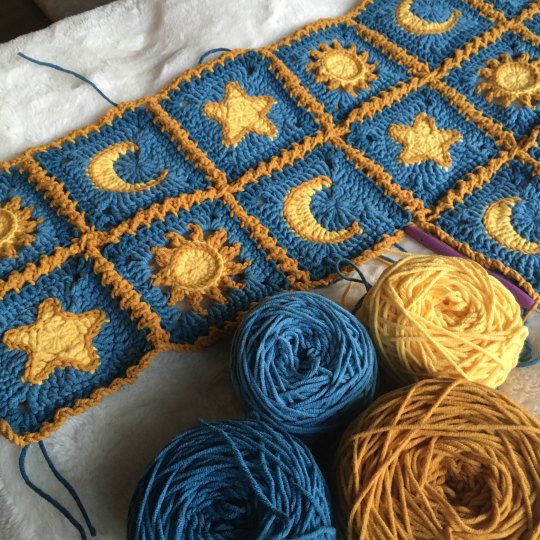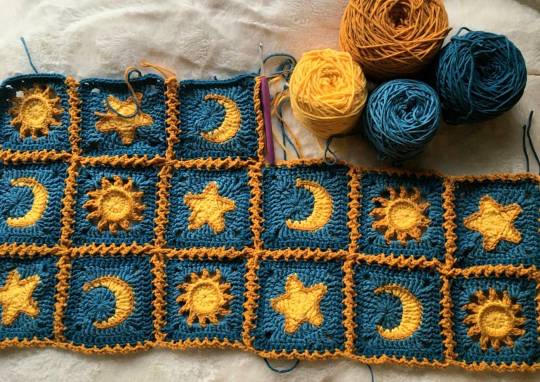Text
Suibian Subs is now closed
The Suibian Subs public discord is now closed. While the download links that were posted there are still working, it must be reiterated:
Please do not reupload to any video sharing websites such as:
Youtube, Vimeo, NicoVideo, Bilibili, etc
Also, please do NOT post publicly that you have the audio drama(s) and are sharing it to any searchable social media websites such as:
Reddit, Quora, Facebook, Instagram, tumblr, twitter X, Threads, TikTok, public forums, easily searchable discord servers, etc.
While you CAN privately share the audio drama among friends in private chats, private discords, etc. Do NOT publicly advertise that you can send a link or friends request or dm!!!
Although we are closed, it doesn't mean we are not watching. MDZS has thousands of fans. We ask all fans of Suibian Subs that if you do see someone advertising or sharing publicly, please let us know via this tumblr (comment) or contact Kitty on discord - I will still be on discord.
Thank you each and every one of you for your support over the years.
We will miss everyone (╥_╥)
285 notes
·
View notes
Text
2023 Worldcon - A Translation of the ‘Sichuan Anti Porn and Illegal Publications Office’ Wechat [1] Post
I saw the screenshot of that deepL machine translation of this post go past my dash for the third time today and felt a need to do something. Stop promoting the use of MTL in matters requiring sensitivity, people!!!! (FYI: It’s that, ‘a post reported to be from a Sichuan government website discusses work done to censor works related to last year’s Worldcon’ in the Jason Sanford Hugo Awards report. The excerpt of the text in his report was translated with deepL. A friend and fellow translator has already voiced concerns over the inflammatory language used, among others.)
成都:三“精”举措为世界科幻大会保驾护航
Chengdu: Three 'Essential' Measures To Safeguard The World Science Fiction Convention
25 October 2023 17:31
世界科幻大会于10月18日至22日在成都市举办,成都市"扫黄打非"办紧盯涉外重点领域,严把沙龙、签售会、 读书会等关键环节,为世界科幻大会保驾护航。
For the World Science Fiction Convention which was was held in Chengdu from 18 to 22 October, the Chengdu Municipal Office for the Fight Against Pornography and Illegal Publications [2] closely monitored key areas concerning foreign affairs. Measures were taken to maintain strict control over important activities such as convention events [3], book signings and reading sessions to ensure that the World Science Fiction Convention ran smoothly.
一是精细前期准备。
The first was meticulous preliminary preparation.
抽调20名业务骨干组成工作专班, 对可能出现涉政涉民族宗教类出版物、 音像和手游等风险点进行梳理和分析,制定工作预案, 分解工作任务;对14个主题沙龙厅的160余名场主、场控员、 协调员围绕"如何分辨非法出版物"等开展培训。
A specialized group of 20 interdisciplinary experts in their field were selected and brought together. Potential categories of politically sensitive and sensitive ethnic group and religion related publications, audiovisual materials, mobile games and other such points of vulnerability were sorted out and analyzed. Tailored response plans were formulated and broken down into tasks which were allocated. Additionally, training was conducted for over 160 floor managers, crowd control staff and coordinators from 14 themed programmes on topics such as "How to identify illegal publications."
二是精心组织审查。
The second, meticulous coordination of reviews.
分3个专项组对成都世界科幻大会初审入围的文创类、文学类、 艺术类等5大类1512部作品进行内容审核, 对涉嫌存在涉政涉民族宗教的作品进行严格把关,对涉 LGBT 等具有争议的12部作品提出处置建议
Three specialised review teams were assigned to assess the content of shortlisted works that had passed the preliminary round of review for the Chengdu World Science Fiction Convention. A total of 1512* works spanning five broad categories including creative media, literature and art were examined. Works under suspicion of having sensitive political, ethnic group or religion related implications were the focus of strict scrutiny. Advice on the handling of 12 works that touched on LGBT and other controversial topics was given.
三是精准督导检查。
The third, meticulous supervision and inspection.
对参展商进行政策法规培训, 现场发放宣传资料3000余张(册),同时联合属地新闻出版、 文化执法等部门对成都科幻大会主题展览参展商展销的1200余种 出版物开展执法检查, 组织四个专班小组不定时对大会221场主题沙龙开展日常巡查, 并派专员对30个重点主题沙龙全程监督,处置突发情况24起, 均未引发负面舆情。
Exhibitors received training on policies and regulations, and over 3000 copies of promotional material were distributed on-site. At the same time, there was collaboration with departments such as the local Press and Publication and Cultural Law Enforcement to conduct inspections on over 1200 types of publications sold by participating exhibitors in the themed exhibitions of the Chengdu World Science Fiction Convention. Four specialized teams conducted irregular (surprise) inspections on the convention’s 221 programmes, while coordinators were sent to oversee 30 key programmes for their entire duration. Twenty four unexpected incidents that arose were handled and on a whole, did not result in negative public opinion.
[1] Some evidence that the WeChat group that this post was published in exists; this is the link to the post at the bottom of the screenshot in the google doc: https://mp.weixin.qq.com/s/IOGiJYCezsMND2rGWSANcQ.
[2] 扫黄打非 - Translation per http://www.xinhuanet.com/english/2019-12/25/c_138657340.htm
[3] 沙龙 / 主题沙龙 - The word salon/themed salons seems to be an umbrella term for events, programmes and activities (spanning forums, panels, talks, workshops and more) based on descriptions from the Chengdu Worldcon website.
*1512 shortlisted works that passed preliminary checks - I wondered if this could be nominations for the Hugo Awards, but first the Hugos does have its own name in Chinese (雨果奖) and there's no reason why it wouldn't be used. Second, given the number of categories and types of things that can be nominated for Hugos, it doesn't seem like they can fit into these '5 broad categories'? And finally there were 1847 valid nominating ballots - It sounds like there could be a lot more nominations than that if each ballot has a choice of any 6 works. But I am not at all familiar with how the nomination works and the official description of the voting system has only left me more confused. Any light shed on this one would be very welcome!
………………………………………………………………………………………
I’d like to think my reading comprehension is fairly decent, and that google and baidu can make up for any gaps in vocabulary anyway. That said, I am primarily a casual translator of songs and poetry, so if there’s anything you see in here that you disagree with, feel free to DM me or drop a message in the notes to discuss! Thank you in advance.
29 notes
·
View notes
Text
Here's the video version of my discussion of the leaked emails that prove the Hugo Awards removed finalists (me, RF Kuang, Paul Weimer, Neil Gaiman & Ep 6 of Sandman) for political reasons, despite us having the required votes. Because too many of you are making assumptions without bothering to read the full exposé.
There's a lot of nuance in this case that I hope people can acknowledge. No, it is not "sinophobic" to criticize the Chinese government's severe censorship policies when anyone who's spent more than ten minutes on the Chinese internet knows how bad it is, and there IS evidence of pressure in this case. There's nothing to accomplish by pretending like it's not a thing. You're not furthering the world proletarian revolution by speaking over the lived experiences of Chinese comrades and denying factually shitty aspects of your favorite AES.
Yes, the Western and presumably white members of the Hugo admin team DID circle back to racism by trying so hard to appease the Chinese government that they preemptively censored Chinese diaspora ~ to be safe ~ on extremely flimsy reasons without even reading our books. And of course, confusing Nepal for Tibet.
It's really not one or the other.
22K notes
·
View notes
Text
Very lovely write up about the musical elements of a fic I really loved and thought about a lot as it was posting (I'll get around to commenting eventually, I swear!) Despite how much of a music person I tend to be, I'm really truly unfamiliar with music aside from classical and whatever pop genres I've been into. I thought the specific comments in the fic (such as re arpeggiation, tempo changes, and emotions) both highly technical and very true to life. I learned a lot about electronic music as a genre and it reminded me again that people are pushing the boundaries of music and art from every direction, even if the approach is unfamiliar to me. It's clear that a lot of time and love went into researching these elements and at the end of the day, it's what kept me coming back to this story and thinking about it again and again - the love and the music.
I adore author writeups about research and specific elements in their writing, and I was so pleased to see this fic had a music writeup. Thank you for writing and sharing this with us - one of my faves for sure!
Since people expressed interest in the comments about the music I used to write my current fic, I wanted to share some of what I explored to write it. I don't think that you need to know this canon or have read this fic to read this post, though I do spend a bit of time talking about how canon influenced the choices I made. Anyone who has been following this fic knows that it was supposed to be porn, and largely, it really still is for the most part a fic about sex. But I did do a lot of research on music with which I'm frankly not very familiar, and the process was really rewarding.
The fic is Time Signature, if you're interested. This post has a lot about music, electronic music, Chinese music, and music theory, as well as some links to music that interests me and inspired portions of the fic. I don't expect anyone to read anything this long, but it was nice to write it.
Canon. One of my favorite things about both book and drama canon is how in synch WWX/LWJ are cultivation-wise. It’s not just that they can predict the talisman the other will use or the seal the other will cast; they also have the same hunches solving mysteries, the same instincts protecting others, the same ideas about where to go. When writing an AU, it’s important to me to show that synchronization (beyond physical attraction and sex), mostly because I think it’s hot.
In canon, however, WWX revolutionizes cultivation, inventing a whole new method when no one ever thought that possible. I also think this is hot. I also think it’s hot if LWJ thinks it’s hot. Look, canonically, LWJ disapproves of demonic cultivation because it will injure WWX’s spirit and body, but imo there is a reason LWJ is so into WWX, and it’s not just because WWX bugs him. It’s not even just because WWX is really cute and happy and exuberant and everything that’s the opposite of his upbringing. I also like to think that it’s because WWX is a fucking genius, and LWJ doesn't mind the idea of upending tradition and the entire cultivation world as much as it really seems at first that he would; he just struggles with anything that could hurt WWX. So anyway, WWX being revolutionary, in basically a technological sense, is important to me.
Wangxian both play music canonically. LWJ’s playing is noted to be particularly powerful, and WWX’s chosen music is at least one part of his revolutionary cultivation method. Additionally, the song LWJ writes for them is an important plot point. It makes sense that in a modern AU, music is a point of connection, so that is what I chose for their careers.
The final point about canon I want to make in connection to the music for this fic is that this is a Chinese canon with Chinese characters set in China. I don’t think it’s wrong to write AUs set in the west. I have done so, and I think there is value in examining a Chinese canon that has become very popular in the west through the lens of the Chinese diaspora. But I also think that there is a lot of value in a western person such as myself trying to learn and understand the cultural context for a canon that I really like, even if I sometimes get it wrong.
I had decided to set this fic in China because I thought the setting would not strongly feature, which would give me an easy “in” to write something set in a place I don’t know much about. Directly after choosing the setting I chose their careers, which made me realize I needed to do a lot more research—both about the careers but also about the setting--than a fic that was supposed to be mainly porn should have really required.
Music genre choice. Lots of AUs I’ve read have Wangxian’s mutual interest be that they both play western classical instruments. This baffles me, but it’s what I’ve seen, so I loosely started there—ie, I spent some time thinking about what would be revolutionary in western instrumental music, which entailed doing some research on contemporary classical music. There are obviously pioneers in any music genre, folks doing new things, but it turned out I just did not know enough about this genre to really understand what would be truly avant-garde.
I took a step back and thought about the instrumental music I have personally heard that feels really new and different, and Philip Glass was the first thing that came to mind. I first heard of Philip Glass when I saw The Hours, for which he wrote the soundtrack. I still think that soundtrack is one of the most beautiful things I’ve ever heard, and I did use it as inspiration for music in this fic, particularly LWJ’s. More on that later.
Philip Glass is great, but for all his eastern minimalist influences, he is a strong figure in the western paradigm. I did some research on Chinese contemporary instrumental music, but most of what I found had a really western flavor. I think there are two reasons for this—one is that I am in the west searching for articles in English; for all that we like to imagine the internet is universal, search algorithms and search history is actually making it far harder than it used to be to find material with which you are completely unfamiliar. Secondly, western music did in fact have a notable impact on Chinese music, which is fine, it’s still Chinese, but I worried about everything I wrote just sounding like it was about western classical, which is a concern of mine I’ll address more later.
Since I wasn’t finding what I wanted, particularly for WWX, in the “art music” (aka, lowercase “c” classical music, which Wikipedia says is also known as “cultivated music, serious music, or canonical music”—ie, instrumental music with strings, winds, percussion) scene, I realized I needed to examine the other contemporary music, by which I mean everything else. Since I am most familiar with rock, Radiohead immediately came to mind, but Radiohead is a band, and there are lyrics. Though the lyrics are not where the meaning of Radiohead songs lie (the vocals are treated as largely instrumental), if there were lyrics, I’d need to write about them, and I didn’t want to. More importantly, Radiohead is singular in what they do, which makes them difficult to categorize, and this makes them difficult to describe textually. You can say that Radiohead revolutionized rock, or even reinvented it, but that is not really addressing how fundamentally avant-gardeRadiohead is. Describing how revolutionary Radiohead is on paper really is just saying “but they’re different!” over and over again.
What I needed for WWX was a music genre that was revolutionary, an entire school of music that felt cutting edge and frankly, unfamiliar, and for that, I realized I needed my brother.
Some stories about my family. My brother is a music artist who creates electronic music. If you want to understand why it took me this long to get to my brother in this thought process, you should understand a few things about him. First, I love him a lot, but we’re not very close. Second, my brother is probably the quietest person I know—like, idk, LWJ levels of non-talking. Last, I do not understand my brother’s music. I’ve tried! I listened to it a lot! But when I didn’t understand, I asked questions, and my brother cannot explain any of it. He’s an expressive guy! Just not verbally, and as a very verbal person, I have a tough time when people cannot use their words. Like, even asking him what type of music he plays, he’ll say something like, “It’s complicated.” (This is a lie. He’ll look at me and say, “Type?” And I’ll try to explain what I mean. And he’ll say, “I don’t know.” And if I said, “Okay, but if you had to label it?” He’d laugh and say, “Why?” And if I said, “So I can better understand your music,” he’d think for a long time, then look very frustrated, and laugh, and say, “I don’t know?” I think we’ve literally had this exact conversation).
Anyway, possibly through one of these type of exchanges, where I’m grilling him like a school marm and he’s acting like I’m making him take a standardized test he hates (I’m his little sister. Would it be easier to subject him to these horrors if he was my little brother?), I learned that one of my brother’s influences is Aphex Twin. My brother loves Aphex Twin. I . . . don’t. I’ve listened to a lot of him (in order to understand my brother better); I do not like it, and I do not understand it. My brother talks about Aphex Twin like he’s a genius (if and when my brother talks at all). Now, my brother is a very smart guy; it’s not that I didn’t believe him when he said Aphex Twin was a genius, but he also gets . . . swept up by things, and as previously discussed, he doesn’t talk a lot, so I didn’t really understand what my brother meant by this. It took hearing about Aphex Twin randomly, in a couple other places, for me to realize Aphex Twin is a Big Deal. When I looked up Aphex Twin at some point in order to better understand the music my brother makes, I found that Aphex Twin is considered by many to be a genius and also a pioneer. Apologies to all of you who already knew that about Aphex Twin.
Sidenote, my brother’s wife is also a musician, though not professionally. She could have been, considering that she was ranked as one of the top flute players in Texas, and Texas is fucking huge. But no, professionally, my sister-in-law is in cognitive science and linguistics, which you may remember was the career LWJ had in Say More (my fiancée is also a linguist. I also know a few other linguists. My life is convenient for my Wangxian AUs, I gotta say). I mention my sister-in-law because my sister-in-law has enough musical acuity to also recognize that both my brother and Aphex Twin are geniuses, which really helped me to understand that even though I’m not really into this music at all, it really is a Big Deal.
So, I researched Aphex Twin and also went to my brother’s website for his music to find out what the hell this type of music is called, and it turns out there’s not a good name. IDM, which stands for intelligent dance music, is a label Aphex Twin himself famously does not like, and my brother labeled his own music as “acid, techno, house, electro.” Wikipedia said that Aphex Twin is known for techno, ambient, and jungle.
Anyway, into this confusing morass of electronic revolutionary music is where I decided to plunk Wei Ying.
Electronic music. Note for this section that I know nothing about electronic music. I’m writing this post partly to document the journey of discovery I went on to write this porn. I’m not really trying to educate anyone so much as I’m trying to provide insight as to what I researched for this fic and what the references are, in case the fic interested you.
When you really get down to it, music made with electronics has as many genres and styes as music made with more traditional instruments, and the labels are just as confusing (see this Wikipedia list of electronic music genres). For instance, “electronica” just means music made with electronics to some people, but to others it’s more specific. You’ve also got a bunch of other terms: ambient, EDM, techno, house, IDM.
This is all based on what I learned from Wikipedia, but here are some loose definitions as I understand them: There’s ambient, which is really made for background listening, and then there’s EDM (electronic dance music), which is made for active listening—ie, dancing. Within EDM you have lots of genres, such as techno; techno is usually characterized by a specific tempo and repeating structure, and house, which . . . is also characterized by a specific tempo and repeating structure, but the tempo is different. From what I can gather, house is also a bigger tent than techno; ie, many different genres and styles can be house, but techno is more often just techno. (Note that part of the reason all of this terminology has so much overlap is that it originated in different places; techno was invented in Berlin, house in Chicago.) Meanwhile, the list of genres of house is so big that it also has its own Wikipedia page, which is almost as large as the list of electronic music genres.
Note that there is such a thing as “house ambient”, which explodes the entire concept of ambient vs EDM. To aid in that explosion, IDM is described on Wikipedia as including styles such as ambient techo, and “is regarded as better suited to home listening rather than dancing.” What stands out about IDM, and the reason it is featured in the fic, is that it’s known for being experimental. (I’ll add that it emerged in the 90s, which isn’t great for my fic. Whatever WWX is doing, he is on the edge, and 90s music already old to him, even if he’s Aphex Twin’s biggest fan! But alas, my research could not tell me what is happening right now, because you really have to be involved in The Scene to understand what’s new. By the time it’s documented, it’s already really a little old.)
If you are researching electronic music and how it is revolutionary, you’re probably going to get into its evolution and history, since this is a new style of music. And if you are looking into the origins of this kind of music, you’re going to find Brian Eno. And if you’re looking into Brian Eno, you’re going to find minimalism.
Minimalism. Brian Eno is an extremely famous dude. I’d probably heard of him before, but I am very good with big concepts and pretty bad with details, so because I didn’t know anything about the bigger concepts behind ambient/electronic music/minimalism, I never paid attention. Now I’m hearing about him literally everywhere, which is funny, since it’s not like he’s new news. Ezra Klein was literally waxing poetic about Music for Airports just a month ago.
Eno is famous for his pioneering work in ambient music and electronic music, and, as one might expect, electronic ambient. Eno was always doing experimental, avant-garde stuff, and early on he embraced a minimal style. He later coined the term “ambient music.”
What’s interesting about this is that around the same time as Eno was doing this in later 1960s/early 1970s, a new kind of art music was being born in classical circles. This is the capital “M” Minimal music, for which—you guessed it—Philip Glass is really famous. And when you look at Philip Glass’s influences, he was deeply influenced by the minimalism of eastern music, especially Indian and Tibetan music. I couldn’t really find anything saying that Brian Eno was directly influenced by traditional eastern music, but Eno is definitely a fan of Glass and vice versa; they really build on each other.
This ended up just being a very cool intersection for the fic that I didn’t plan. I didn’t end up using it very much, but I must say I was stupidly pleased that the kind of music I was looking into for both of these characters has such deep roots in eastern music traditions. So now let’s talk a little bit about eastern music, specifically Chinese music, since that’s where this fic is based.
Chinese music. I did read a bit about Chinese music for this fic, and I have to say that I still don’t know a lot about it. As stated above, I’m in the west, using my western search techniques, looking for primarily articles in English (though I get Google to translate some things). I also just have a western understanding of music and music history, and it turns out, surprise, different cultures are different, and my entire paradigm for understanding music does not really apply to music from other cultures.
I, and many of us, want music to be a universal language, something that can move through all barriers and touch us in our souls. And it is! I have listened to and loved music not from my culture! But thinking of music as something intrinsically universal and therefore immediately moving to everyone really collapses the rich history of musical tradition all cultures have. Music really is like a language, in that it is built on the culture that creates it; it has its own internal logic; it has style and meaning that depend on the history of that tradition and the understanding of its audience. The brief reading I’m going to do to write some porn will not give me to understand the deep and rich tradition of Chinese music, but also, frankly, even if I turned all my efforts and career to learning and understanding this right now, I still would not have the best comprehension. I don’t even comprehend western music, and I grew up with it. So, forgive me for the paucity of my understanding and knowledge, and please correct me if I make mistakes.
When I think about Chinese music that I know about, I think of two things: modern and traditional. The modern stuff I’m thinking of is stuff like C-pop, but also the things you might hear on the soundtrack for a drama or movie. To me, none of this music sounds that different than western pop or western soundtracks. There are a few reasons for this: one, there are tons of Chinese music that is not reaching me. Two, maybe I just think it doesn’t sound that different because I can only really process what I recognize. Three, in a similar vein, maybe I’m thinking “that sounds like what I know” when really what I know sounds like what I’m hearing. Globalization is definitely doing things to music; if you’re telling me that Asian pop is not influencing western pop right now, I’m going to think you’re crazy, considering the influence and popularity Asian pop has in the US and Europe right now. And four, western music did have an impact on Chinese music, so there’s that.
Obviously, the music genre I chose for Wei Ying falls into the modern sphere, and I certainly looked into the techno/EDM/IDM/electronic/ambient/house scene in China. Articles I found stated it took a little longer for EDM to pick up steam in China, but now it’s definitely going strong. There are some great electronic music festivals, EDM clubs, underground EDM scenes, and EDM music artists (composers and DJs!) in China. Researching these artists was pretty difficult, especially because I wanted Wangxian’s musical discussions to be highly technical, and for highly technical discussions about EDM you are wandering into some very niche spaces. I’m sure such spaces about EDM in China exist, but they’re most likely to be in Chinese.
As I’ve said, globalization is a factor when it comes to cultural difference in music, and I’d add here that because this genre of music is so new, globalization has even more influence, from what I can tell. That said, I do not want to diminish how much influence very specific locations have to do with this type of music. EDM is very tied to clubs (because of the dancing) and performance (because of deejaying, and also because of things like live coding/algorave), which is probably why we get so many granular genres of house—Chicago house is different from Detroit, just for example. Regardless, I stuck with researching a lot of western artists for both the music and musical discussions in the fic, mostly because the music is supposed to be so new and avant-garde that is should not be something overly familiar to the reader, even if they’re steeped in electronic music genres.
Then there’s traditional music.
Traditional music. Traditional music obviously had a huge influence on Chinese modern music. The influence of traditional eastern music on modern eastern music, as well as traditional eastern music itself, is what really influenced a lot of western minimalism of the 1960s and 70s (and onward). To be clear, not all “eastern” traditional music is the same. It’s just as richly diverse regionally as traditional western music, if not more so, given “the east” is fucking huge—though I will say that a lot of people think of western music as pretty monolithic, because folk is characterized as a separate tradition than classical. When you consider ancient western folk, there’s a shit ton of it, and it’s quite diverse. There is also folk music in eastern music traditions, and this is different than music that would have been played in courts and palaces, so there’s really a ton going on.
Traditional music is what people think of when they think of eastern music being “weird,” which is something I really hate. Look, I love being weird; I think weird is cool; it’s great. But weird means unusual, and traditional music is very usual; people who say that just mean it’s unusual for them, and they should think about their words. What they’re trying to say is that traditional eastern music will sound very different for many western listeners, even though, again, we like to think of music as so universal, actually!, because it’s based on math, actually!, and math is so universal!!! The truth is that math is patterns, and patterns are things that your brain recognizes when there are familiar elements, and when there are unfamiliar elements your brain has trouble recognizing the pattern. So, again, music is a way to communicate across all kinds of boundaries, but it is not a universal translator. (But it does make you wonder . . . if Lan Zhan played Inquiry, could Aeneas answer???)
Regarding the unfamiliar math, what we’re talking about is scales. I think most people know this part. Eastern scales are based on math, just like western scales, but the frequencies are divided up differently. Among other things, traditional Chinese music did not use equal temperament, which means depending on what note you start with, the intervals for all the notes on the scale were be different. A way of thinking about this, at least as I understand it, is that a piano is even tempered. All the notes are always the same whether you’re playing in C major or B flat, because you have no control over the frequency produced when you press the key. But if you’re using just intonation—say you’re using an instrument with just a few strings—you’re adjusting the frequency of the note to match your scale. It requires extremely precise hearing and playing ability.
Notation for traditional Chinese music was really different than how I as a westerner understand it. For one thing, it didn’t include rhythm, and for another, it represented more a framework for improvisation than every single precise note. (See Gongche notation, Wikipedia.)
Authorship was also thought of pretty differently. When I googled “great Chinese composers,” the only results I was getting were twentieth century. There are some great ancient Chinese composers, but I had to do a lot of digging to find them, and trying to find someone like the Chinese equivalent of Beethoven is just the wrong approach. When you get right down to it, this really seems to be about the fundamental difference between western individualism vs eastern collectivism and community-based thinking. The individual artist is not the hero of the story. That said, the tradition of the music is very heroic. For instance, the notation allows such variation that the same piece can really build and grow through different artists, much like a story through oral tradition. Additionally, for an artist in an ensemble piece to stand out would really be quite rude; the point is not the individual talent of the musicians but the fundamental beauty of the piece. (This was a particularly hard thing to research, and I mostly found out what I laid out above from various folks answering questions in forums. The best one I found is here.)
Another thing is that harmony, as we think of it, was just not really a thing in traditional Chinese music. The focus was on a melody, which is where minimalism comes in. I’d add here that the “as we think of it” is pretty important, because the western paradigm, including western music language, is not super great at really capturing the nuance of Chinese music. I am terrible at tracking my sources when I research stuff for fic, so I was trying to find some of them now, and I came across this article, which examines the harmony that did exist, but how different it is from what we think of when we think of western harmony.
Despite the reading I did on this subject, very little about Chinese traditional music made it into the fic. I do have Lan Zhan reading a book on traditional music that he hates. This isn’t based on a book I found, but rather to show that Lan Zhan isn’t really into the idea of musical “purity,” that is, ideas of what you should and shouldn’t do with music. That said, I’m not really aware of what strictures around traditional Chinese music are like, or what the Chinese thought is on that. I am aware of how deeply restrictive western thought is regarding music theory, and that’s really where that part of the fic was coming from.
I’d originally had Lan Zhan reading a book on western music theory and very deeply hating it, but I also felt like having him read a book on western theory could reinforce the idea that he’s working within a western paradigm, when really the whole point is that this Lan Zhan very intentionally uses traditional music values. Due to his inspiration from Wei Ying, he’s breaking the norms of how that music works, but he's not necessarily making it western; he’s making it avant-garde. Basically, my inspiration was a Chinese Philip Glass, but I didn’t want to say that because as mentioned above, Glass is still western, no matter his influences. That said, Wei Ying does compare Lan Zhan to Philip Glass and also Tan Dun, who you might recognize as the guy who did the soundtrack for Crouching Tiger, Hidden Dragon, among many other very famous projects.
Tan Dun has in fact been called the Chinese Philip Glass, which is probably not very respectful to Tan Dun, who is himself an incredible (and experimental!) composer. I should note, however, that Tan Dun is Chinese American—he was born in China, but got a degree at Columbia and has lived in New York since. Also, he is particularly famous for marrying Eastern traditionalism with western style, and that really wasn’t what I wanted for Lan Zhan. I didn’t want Lan Zhan to be incredible because he was using western traditions, though he is familiar with them and can make very talented use of them. A lot of very famous Chinese modern composer are famous for that, and that music is still very Chinese. That said, I felt that if I made that Lan Zhan’s style, it would feel like I was saying Lan Zhan’s music is special because it’s western, and that was something I really wasn’t keen on.
In the end, I possibly did the fic and traditional Chinese music a disservice by having Lan Zhan read his book and hate on it. One of the whole reasons western music theory sucks is it can be pretty racist, and that’s what I was trying to avoid, but by conflating my rage at western music theory with eastern, I didn’t really help things much. But anyway, since I’ve now mentioned it, let’s just take a slight detour to talk about what I mean by racist music theory.
Western music theory racism. There’s a scene in the movie Tár that really solidified my feelings on the subject. In it, a student who identifies as BIPOC and pangender, says they don’t really have much use for Bach because of Bach’s misogynist history. The extremely famous director, Tár, played by Cate Blanchett, lambasts the student for “cancelling” Bach because of Bach’s personal life. The student goes on to say that they really just don’t have much interest in cis male white composers, and Tár continues to lambast the student for considering things like gender and race in conjunction with the art.
My understanding of this scene was that it was demonstrating that Tár is a jerk, so full of herself that she can’t listen to other voices, and so steeped in her 18th century western ideas of genius that she’s literally silencing the music voices she’s supposed to support. That was not most people’s reading of the scene, and in retrospect, possibly not the intention of the film. It seems rather telling that not a lot is known about Bach’s misogyny or lack thereof; there are plenty of other “great” western composers that are known to be worse in terms of misogyny and abuse, and yet the film did not make this scene about them. In retrospect, maybe that scene wanted to paint this student as kind of ignorant for cancelling Bach, and Tár really puts them in their place when she describes how art is more important than the artist.
Fuck that. I certainly believe that art is more important than the artist. JK Rowling sucks; that doesn’t mean I will stop loving HP fic and the part it’s played in my life. But the ugliness of the scene is that it hinges on importance of Bach, and look here, shocker, Bach is not essential, just as JKR is not essential if you decide you don’t ever want to familiarize yourself with the literature of TERFs. Even if you want to be a musician and create or conduct music, Bach is just not essential.
He’s pretty important if you want to be a western music historian, true, but when we talk about music there are many, many music traditions that are incredibly worthwhile and important that not only weren’t created by cis white men, but also weren’t ever derived or influenced by cis white men. If you think that you need Bach to know and love and create and perform and conduct music, it’s because you’re operating in a single paradigm that has become yes, universally known, but also for that reason oppressive and imperialist. I am not saying western classical music is bad because it’s imperialist, just to be clear. Bach’s great! Hate ‘im, but I do love me some Beethoven and he was also very cis and male and white and also a complete douche! What I’m saying is that forcing this music tradition on others is deeply imperialist, and it happens all the time.
Anyway, this is really a tangent, because despite my very good intentions to write about Chinese music, as I have stated, almost everything I used for reference was western, even a lot of the stuff I listened to. Maybe I just wanted to acknowledge that that’s a little racist, even though I tried not to be. Maybe I also wanted to hate on Tár and leave you with this interesting video about white supremacy in music theory.
References. Finally, we’ve reached the part I had originally intended to post, which is why I started writing this. Below are the essays and articles I used to write this fic. They were used in three ways: 1) to describe the music (though I also listened to things, see next section), 2) to inform Lan Zhan’s critiques and Wei Ying’s ideas—though I read a lot of essays to do that, just a crazy amount considering how little of the fic is actually about that, and 3) to describe the reading material Wei Ying and Lan Zhan exchange.
Music Beyond Airports – Appraising Ambient Music
This is a series of essays largely focused around Brian Eno’s Music for Airports, though there’s a lot of other stuff as well. I didn’t read everything in here, but the collection is absolutely fascinating. “Ambient House: “Little Fluffy Clouds” And The Sampler As Time Machine” is one of the “articles” Wei Ying sends Lan Zhan; meanwhile, the collection as whole is what Lan Zhan sends Wei Ying when he says he’s been reading about ambient house. Additionally, “Adaptive Game Scoring With Ambient Music” really influenced Lan Zhan’s commentary about arpeggiation, the first time he comments on Wei Ying’s music.
Counterpoint - Tracking in the Music of Aphex Twin
I have some embarrassment about this, given that the article is about counterpoint, and as I have discussed above, eastern traditional music doesn’t really employ that in the way westerners think about it. However, it’s also pretty backwards to restrict Wei Ying to traditional eastern music, as modern Chinese music includes plenty of counterpoint, and part of the point of the fic is that Wei Ying is doing entirely new things that haven’t been done before. Well. They’ve been done by Aphex Twin, as described in this piece, which also describes the first piece that Wei Ying plays for Lan Zhan in the fic, in the car. I did lift the phrase “pedagogy of counterpoint,” and could not decide whether it was long enough or significant enough to credit in the fic.
Unequal Temperament: A Review of Aphex Twin’s SYRO
I can’t remember what I used this article for. It’s an interesting read.
Reverb Machine (the entire website)
This is the site I kept returning to over and over and over again. Most of the articles about electronic really focus on either the equipment used or chords. In the fic, Lan Zhan isn’t supposed to know much about equipment or how any of it is used, because he does not do electronic music. Also, I didn’t really want to talk much about chord progressions, because those discussions are steeped in western music theory, and I wanted it to be possible for Wei Ying to be using the kind of scales traditional Chinese music used, even if a lot of modern Chinese music does use an even-tempered 12-tone scale. However, this site has a lot, and I ended up returning to it again and again so Wei Ying could say an offhand thing about reverb, and to describe certain things.
Notably, Wei Ying’s track, sex.mp3 is loosely based around Trent Reznor’s and Atticus Ross’s soundtrack to The Social Network. I haven’t even talked about Trent Reznor, but he was also someone I considered deeply when I started thinking about making Wei Ying do electronic music. In case you don’t know, Reznor was the artist behind Nine Inch Nails, but in later years he moved on to more experimental things, including movie soundtracks. Side note, movie soundtracks and video games is where a lot of these experimental artists doing either minimalism, ambient, or electronica, or a combination of all three end up, and I ended up reading a lot about video game music.
But anyway, when I saw the Social Network, I came out of it 1) admiring Aaron Sorkin and wishing I didn’t admire Aaron Sorkin because he’s kind of a douche, 2) shipping Mark and Eduardo way too much for my comfort, 3) going HOLY SHIT THAT SOUNDTRACK. Turns out I was not alone in finding that soundtrack totally different and new compared to anything I have ever heard, because as it turns out, it really was—wait for it—revolutionary. I understand that I have now said that about Glass, Eno, Radiohead, and Aphex Twin, but hey, people are doing things in music. Like I get that pop and hiphop artists are revolutionizing their genres all the time, but also it is possible for music as we know it to be redefined, and it’s not just the weird shit you hear that sounds like noise (there is a place for the weird shit that sounds like noise, and Brian Eno is closer to it than any of the above mentioned; I am not dissing weird shit that sounds like noise, because it is part of how we get where we are going).
Anyway, I used this website’s essay about The Social Network’s piece, “In Motion” to describe some of the music and inform some commentary on it.
“East Meets West: A Musical Analysis of Chinese Sights and Sounds, by Yuankai BaoSounds, by Yuankai Bao” by Jiazi Shi
This was the only essay I found that really had the extremely niche technical jargon that I really wanted for the fic that was also about Chinese music. You’ll note that it’s about a Chinese composer who is, again, famous for marrying eastern and western tradition, but this was what I could find in English, and I searched a lot. You’ll note that Lan Zhan’s very specific comment about the key change is something very directly inspired by this grad school dissertation. You’ll also note that this is where I found “Flowing Stream,” including a description of the song and the lyrics.
Music. A lot of fics like this one will link you to a specific piece that the character is playing. I could not do that, because the music in my fic is very intentionally made up. As I have been saying, the whole point is that Wei Ying is pushing the boundaries, inventing music that does not exist. So is Lan Zhan, by the end. I listened to music to inspire the descriptions, but it is not what they are playing, and almost none of it is Chinese. I’d be very interested in finding some Chinese music that is working on some of the principles of minimalism and electronic that these pieces employ.
Aphex Twin – Stone In Focus
Now you’ve come to the climax—this is really the story of how I learned to love Aphex Twin. This piece makes me cry. It’s what I used to describe the piece that has the remix of Lan Zhan’s guqin piece from 12 years ago. Obviously, the guqin piece mentioned in the fic is the canonical piece, Wangxian, but I find Wangian in the drama cheesier than I want it to be, and this Aphex Twin piece doesn’t have the Wangxian part. It’s just the sad longing part before Wangxian enters, but you’ll also notice that there are no flutes! Again, this is not the piece Wei Ying wrote; it’s just what I used for the description.
I didn’t link to the YouTube video I was watching, because the video was a collection and this didn’t come on until after minute thirteen. But that video just has this very sad tunnel that looks like maybe it’s for a train, and the rain is falling, and that makes me cry as well: https://www.youtube.com/watch?v=BHl4NVytGpo&t=1074s
Book featuring Ndidi O - Hold On, I'm Coming
Wait, you’re saying, this is not electronic/house/ambient at all; this is just a trick to get me to watch one of your favorite wangxian vids! You’re right! But frankly, I was not focused on the genre when describing the music; I was focused on getting the feel of it that I wanted. The opening sequence to this was what I used to describe the track they make love to. (Lan Zhan starts making out with him and kind of slowly humping him to the track with the wangxian remix, but then Lan Zhan demands he plays something else, and this is what I listened to to get the feel for it.)
This pieces is a cover, and frankly, I can’t find out much about it. But just thinking about it turns me on and makes me cry and makes me feel so much, I can’t do it too often.
Trent Reznor and Atticus Ross – “In Motion,” from soundtrack to The Social Network
As noted above, this piece inspired sex.mp3, but I will say that the article I linked above about this piece, as well as the memory of the soundtrack itself, inspired descriptions more than listening to the piece itself. In the fic, sex.mp3 is initially described as “violent.” This was because I didn’t know if the track would play a big part in the fic, and then when it did, I really had to change to both to fit the meaning and the flavor I wanted; it became “anxiety inducing,” and that’s when it became “In Motion.” “In Motion,” however, is kind of too bright and peppy to really be sex.mp3, though I will say I was trying to listen to it just to write this section of the post, and I had to turn it off. It makes me SO anxious.
Philip Glass – soundtrack to The Hours
I’m linking the whole soundtrack, because in the fic Lan Zhan writes several related pieces, which is what this soundtrack is. I can’t even recommend one piece on this soundtrack, because it’s the thing as a whole that really makes you cry, and I can’t say I listened to a specific part of it to describe Lan Zhan’s music, because I know it so well that I only have to listen to a small piece to get all of it.
Flowing Water, played by Chen Leiji
The part this played in the fic is obvious. I listened to at least five versions of Flowing Stream/Flowing Water, and this is the one that I like the best. However, like all the renditions I listened to, the piece eventually becomes pretty complex and different than I wanted for Lan Zhan. In fact, what the narration describes as “showing off technique” is what I found in all recordings of this piece. I guess if you’re going to play “Twinkle Twinkle Little Star” on YouTube you’re going to do something impressive with it, but I will say this piece is still very close to what I wanted.
I will also say that when I searched for this piece, as well as several other traditional songs, the search results had a lost of stuff that said you can listen to these pieces for tranquility and calm and meditation. I suggest listening to this one as extremely passionate and longing, and you’re going to get a lot more from it. If you resign it to the background, yeah, it’s kind of nice. If you let each note really speak to you, you’re going to really ache in a beautiful way.
Brian Eno – Ambient 1, Music for Airports
After hearing so much about Eno and Music for Airports, I was a little afraid I wouldn’t like it. After all, this isn’t really my genre, and witness how long it took me to find something I liked by Aphex Twin. However, I really needed some inspiration for the piece Wei Ying composes after Lan Zhan breaks them up, so I started listening to it.
The opening to this album is not the heartbreaking thing that the fic describes. It in fact does break my heart, but that is because there is something so sweet about it, lonely and sweet, but also perfectly fine being by itself. This piece is like a child alone in a room, figuring out blocks. This piece is like a cat on a piano, content with its nonsense noise. This piece is what it’s like to be alone and to be fine with that, to love from afar and be fine with that. It still brings me to tears, listening to it.
Radiohead – Everything in its Right Place
Apparently I did not succeed in writing all the music without Radiohead. I will say it happened because I happened to be watching a TV show that just happened to use this song right when I needed something powerful. I was already thinking about them, because my BFF was listening to a podcast about In Rainbows, which explains the children shouting “Yay!” in 15 Step. I really wanted something other than rain to get sampled in Wei Ying’s music, and my brother has specifically used his children talking or his babies crying as samples. Once Lan Zhan knows about A-Yuan, I wanted to use that idea, so I listened to 15 Step again, which is far too peppy for what I needed. But then Everything In Its Right Place came on, and it’s actually way too melancholy for what I needed, but that doesn’t really matter; I just needed to get a few notes described, so this is what I used for inspiration for what Wei Ying plays Lan Zhan after he admits to being in love with him. I will just say that re-listening to this song really does remind me of just how much Kid A means to me, but also how much it means to, like, music. There was really nothing like it at the time.
-
I will end this post by saying that I am not, in fact, a "music" person. So many people need and rely on music to get them through tough times. I mostly don't care about it. I don't have a Spotify account, and I can't imagine taking the time to really curate playlists.
But one thing I can say about me and my tastes is that I'm interested in learning. I want to try new things and hear things that I haven't heard before. To be a little self-aggrandizing, I think that that's a good thing. I think it makes me a better person to work on listening to things that I'm a little unfamiliar with and learn what's great about them. I think I got to do that quite a bit writing this, even though in the end I used a lot of pieces I was familiar with to do the actual writing. I hope that maybe someone reads this and decides to listen to something new, just like I did.
63 notes
·
View notes
Text
Guys I'm really asking you to take a breath before you reblog something.
I keep seeing posts that are sourced purely from images with no link back to the source. Images are trivially easy to fake - are you sure it's not propaganda?
I keep seeing posts that come from sources that aren't journalistic organizations. We've just gone through a whole blow-up about James Somerton and how easy it is as a "creator" or "blogger" to, to put this kindly, be cavalier with sourcing/verifying information. Please take a moment to verify the facts with some sort of ethical reporting organization before you rebagel it.
There are a lot of stories that don't get picked up by news organizations, or if they do, details don't get reported. And so it's really easy to just assume that's why you haven't heard about a specific thing. But that's a really easy loophole for bad actors to spread outright misinformation or something seasoned with the truth.
There's a lot of bad shit happening right now, and it's only going to get worse as the world destabilizes under climate catastrophe. When so much is already being asked of all of us, it's one more thing to do - but it's also a form of harm reduction.
Please think about it.
4K notes
·
View notes
Text
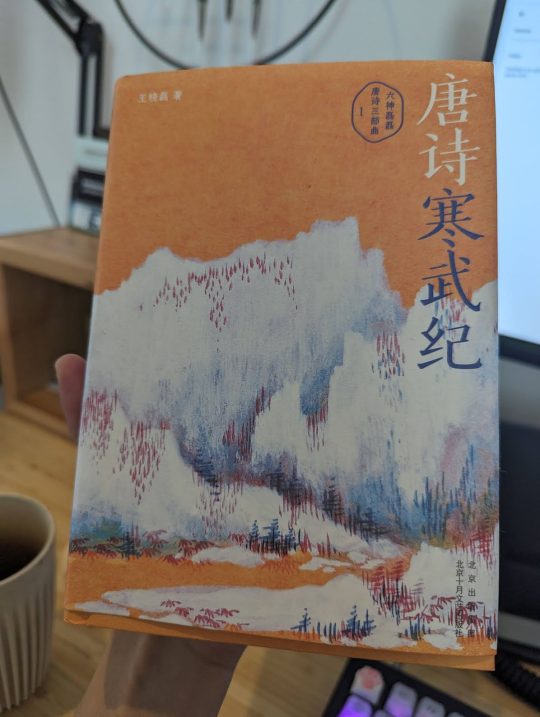
I just wanted to translate a lil' bit of this book I was reading, because I didn't realise just how many poems (in the case of this book, Tang dynasty poems) that have been lost to the ravages of time, and what a miracle it is that we even have a 唐诗三百首 today. Short note from me about translation approach is at the end under the cut.
唐诗寒武纪
王晓磊 (六神磊磊) 著
ISBN: 978-7-5302-2250-8
The Cambrian Age of Tang Poems by Author Wang Xiaolei (ISBN: 978-7-5302-2250-8)
Chapter 1
Do you know how fortunate you are to be able to read Tang poems today?
我志在删述,垂辉映千春。- 李白
My ambition is as grand as when Confucius compiled The Book of Poems, so that the radiance of my poems may shine a thousand springs from now.
At a time 400 years ago from the present day, during the Tianqi Era (1621-1628) of the Ming Dynasty, when Eunuch Wei Zhongxian’s (魏忠贤)authority could eclipse the heavens-
In the Haiyan district of the Zhejiang Province, there was an old man who silently shed his official’s robes, and folded them neatly. This was a set of blue robes embroidered with white pheasants, signifying that he was a fifth-rank court official.
Outside, someone yelled, “Official Hu, why haven’t you come out yet! We’re waiting to escort you to De Zhou so you can take up your post there!”
“Take up my post?” The old gentleman gave a small smile, then muttered to himself, “Goodbye, court politics! I have long grown weary of you. I’m going back to my hometown, and spending the rest of my years completing a very important matter- to compile the most complete set of Tang poems, so that there will no longer be any left out, so that no longer will there be any lost to the ages, so that our descendents can read them all!”
Let us remember the name of this old gentleman: Hu Zhenheng (胡震亨).
Perhaps it is very difficult for people of the present day to understand - wasn’t he just wanting to make a compilation of poems, was that really so difficult? Did he need to really go this hard and quit his job? Actually, yes. Back in that time period, it really was difficult. During that time, there were no publishing companies, printing factories, libraries, or convenient search engines. If you wanted to look up a poem, you’d have to pore through countless scrolls, you may even need to trek over mountains and cross rivers just to be able to make a copy - and even after all that, you may not even have been able to make that copy.
If Ol’ Hu slacked off, and didn’t make this Tang poetry compilation, what would have happened? The answer to that is, that the consequences would have been very dire.
At that time, Tang poetry was already starting to go extinct just like how our flora and fauna species are going into mass extinction today. According to Hu Zhenheng’s estimations, at least half of all Tang poetry had already been lost.
Perhaps you are thinking, how the hell does poetry just go missing? As long as the poet is good enough, as long as the poem is good enough, then wouldn’t such works just be passed down through the ages, and be able to endure, that way?
It really doesn’t work like that.
Let me ask you a very broad question: out of all of the Tang poems, which one is the best? Perhaps many people will respond, off the top of their heads, “A night of moonlit blossoms on the river in spring” (春江花月夜“). This poem is lauded as the “A singular page eclipses the entire Tang dynasty” poem of poems, after all. Well then, who is the author of this fine poem? Many of you readers can answer, Zhang Ruoxu.
This Mister Zhang has written such a great work, and has made such a great contribution to Tang Poetry. Well then, how many of his poems remain today? A hundred poems? Eighty? The answer will shock you - merely two of his poems remain today.
The only reason “A night of moonlit blossoms on the river in spring” was able to be passed down to the present day, is really nothing more than a giant fluke. It was thanks to a very accidental opportunity, that when people in the Song dynasty were compiling a book of songs and ballads for their music bureau, they recorded this very poem by Zhang Ruoxu into the compilation, and enabled it to be passed down through the ages.
Apart from two poems, all the other works created by Zhang Ruoxu in his lifetime, do not exist today.
Now let me ask you another similar question: out of the pentasyllabic quatrain poems (五言绝句)in the Tang dynasty , which one is the best? Many will immediately respond, “Climbing White Stork Tower” (登鹳雀楼). Yes, the one which everyone recited as a child - the sun sets against the mountains, the yellow river flows into the sea” (白日依山尽,黄河入海流). Its author is recognised by most people as Wang Zhihuan (王之涣).
So then, how many poems has the great poet Wang Zhihuan left behind? The answer will again flabbergast you as you read it: there are only six poems left behind, the rest are all gone.
Within a thousand years, we do not know how many lines like “the sun sets against the mountains (白日依山尽)”, and “the tides of the ocean and the moon rise in tandem (海上明月共潮生)” have been lost to the ages forever.
The misfortunes of our friends Wang Zhihuan and Zhang Ruoxu, were not mere happenstance.
How many poems of Li Bai (李白)have lived on to see the light of today? The most pessimistic takes say that, about one-tenth of all his poems exist today.
This great genius has been writing poetry all his life, so estimates of his total poem count sits at around five thousand to ten thousand poems. For every ten of his poems, we may never ever be able to read eight or nine of them.
Before passing away, Li Bai had sorted out all of the drafts and writings he had made in his lifetime, and solemnly entrusted it all to his uncle (族叔), Li Yangbing (李阳冰), and asked that he compile them into volumes, so that it can be passed down through generations. Li Yangbing did not fail Libai’s wishes, and poured his heart into compiling the Thatched Cottage Anthologies (草堂集)of which there were ten scrolls … which then subsequently got lost to the ages in the Song Dynasty.
Now let’s talk about Du Fu (杜甫)。Essentially all the poems written by this similarly great poet before the age of forty, have been lost to the ages. How long did Du Fu live? Until age fifty-eight. That is to say, that all the poems he wrote for most of his life, were all for nothing.
Another big shot, Wang Wei, (王维)fared no better. During the Kaiyuan era alone (713-741) he wrote hundreds if not thousands of poems. By the end, less than one-tenth of the total remained.
There are countless other examples. The early Tang poet, Song Zhiwen(宋之问)was big-name poet who established the foundations of regulated verse poetry. He had poetry volumes circulating during the Tang Dynasty, however the circulation still ended during the Jiajing era of the Ming dynasty, and was finally lost during the Wanli era. All twenty volumes of the writings of gifted female scholar-official, Shangguan Wan’er (上官婉儿), were entirely lost in the Song dynasty, and we only have thirty-two of her poems remaining today.
The poetry volumes written by one of the “Elite Fours” of the early Tang dynasty, Wang Bo (王勃),the genius who famously wrote “the hues of twilight fall in line with the solitary flight of a wild mallard (落霞与孤鹜齐飞)”, were arduously able to survive for a few hundred years, however, come the Ming dynasty, they were all completely lost all the same.
This is like saying that the complete works of Jing Yong (金庸)were all lost to the ages, and you would only be able to glean snippets and excerpts of his original writings from the column writings of Liushen Leilei (六神磊磊)to get your hit. Just the thought of it makes me want to cry.
The great Meng Haoran (孟浩然) can be counted as lucky. Shortly after he passed away, there were already people making compilations of his poems. Even so, many of his creations have still been lost. There is also the great Li Shangyin (李商隐), who wrote “the silkworm spins silk even ‘til death (春蚕到死丝方尽)” and “our hearts are connected through a singular nexus (心有灵犀一点通)” personally compile forty-odd scrolls of his writings, however, those have all been lost, and not a single volume remains. His poems have all been scrabbled together piece-by-piece, by those after his time.
So, do you still think that those poems have been lost to time, purely because they were shoddy poems, of little worth, so no one wanted to remember them? Not at all. Even if they made a mark in their heyday, poems that are handed down will eventually be lost to time, all the same.
People in the Tang dynasty have recorded, that of Li Bai’s CiFu (辞赋)poetry, the poems Dapeng Fu (大鹏赋)and Hongyou Fu (鸿猷赋)were incredibly marvelous, that they even surpassed the calibre of writings of the big guardians of CiFu poetry from the previous generation, Sima Xiangru (司马相如) and Yang Xiong (杨雄). Fortunately, we can read Dapeng Fu today, but … where is Hongyou Fu? Sorry, it’s gone, lost forever to the ravages of time.
Translator’s note:
There are many ways to do a translation, and this one is more for the vibes than for the “literal” translation - that is not to say it is inaccurate, but as someone who has translated for years from Japanese to English, or from time to time, Chinese to English (when I feel like it lol) I thought I’d state the purpose of this translation so you can get a sense of my choices here. I am translating this very casually and more for speed / for fun, it is a very pulling-words-off-the-top-of-my-head translation than the other kind of translation I do where I sit there for hours milling over a singular word. A partial reason for why I can do this style of translation is because the prose of the book itself is very conversational and casual (I will tangentially note, this writing style is kind of controversial with the Author’s other works that discuss poetry, as some readers view it as “low-brow”, but for me, I like it. I think it makes the content very digestible and accessible to readers who are new to poetry). This translation is for my buddies in the poetry club, who are mainly diaspora and/or can read Chinese to any extent anyway (in particular, I want to thank the funny and great @fwoopersongs, for always being here to chat poem stuff and making me interested in the lives of the poets and the context surrounding the poetry rather than just the poems themselves). As such, I will try to remember to include the Chinese characters for people’s names, so you can read it with the correct tones. I bought this book and started reading, and thought wow, this is cool, I want to share it. A lot of the Chinese terms here I’ve only thought about and experienced in Chinese, I don’t watch Mandarin-language shows with any subtitles, and I don’t typically experience other Chinese Media in English so I am not sure what the “standard” (if any) terms in English would be - it’s for the vibes, especially the parts where I am translating literal poetry. The author pulls verses from poetry here to set the tone for the start of a chapter, so the goal of my translation here is so that it convey to the reader a reason why that verse was chosen, rather than the “perfect” way 千秋, 碧落,独倚 or a word like that is translated (or, for example, everyone let’s agree on a translation of the poem title “春江花月夜 - pain - lol). I do not think I can do any of these poetry translations justice, as poetry translations in any language is more like a feeling of the soul that you try to fit within the available confines of another language, hoping that the reader on the other side can experience something in their own individual way through your shared humanity rather than language alone. Also, I do have a lot of commentary and notes that I wanted to make but I might do that in a different place (maybe as footnotes) at another time, I don’t want to interrupt the flow of the reader by sticking my own comments everywhere.
55 notes
·
View notes
Text
So I made a Mamianqun!
I've been wanting to make a one for so long. Then I saw this fabric in an outlet that sells faulty fabrics discarded from factories, where you can find some unusual stuff that you can't find in regular shops.
This fabric is supposed to have this print all over, but got only printed at the bottom. If you squint you can see faded print marks on the middle section too. The moment I saw this I immediately thought of a mamianqun because a lot of mamianqun come with bottom print 😍.
However do not copy me in this, because I only thought of the pattern and not the fact that the fabric is too bulky and heavy especially for dress with humongous volume. It does not make for for the nicest, crispiest pleats as you can see in the pictures below. Also this is gonna be such a pain to wash and dry.
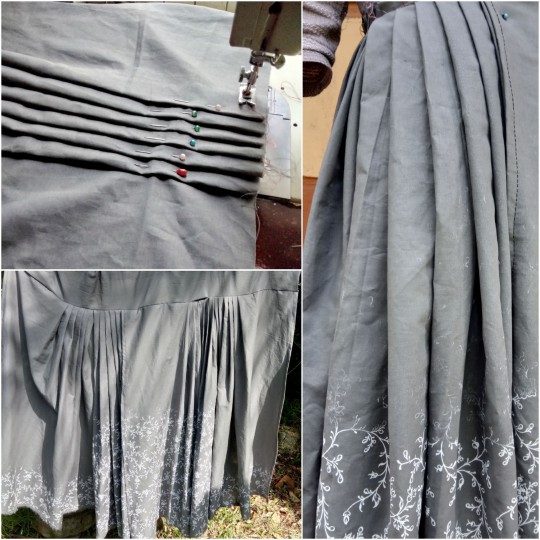
But I will give myself a pat on the back because this is my first attempt, and for someone who has never taken a formal sewing class nor is able to properly follow any instructional guide because I'm scatterbrained like that, I think I did a pretty swell job! ☺
Even though it took me a whole damn day and numerous frustrating unpicking and redoing over and over again, lol.
Though I am not able to provide you a guide (because like I said, I myself am incapable of following any), I used the following four sources to get an idea about what I am trying to do to begin with. I studied these four, then attempted it myself and figured it out gradually as I went, through trial and error.
.
1. This helped me understand the overall geometry of the garment.
2. This gave me clear visual aid about what the end product should look like.
3. This doll-size mamianqun video was simple and gave a very good and non-complex demo of the process.
youtube
4. This helped me with understanding how to attach the waistband.
youtube
.
The modifications I added myself are:
Making the waistband a button-up. As the skirt was already so heavy, I thought a long strip of a tie would make it even more difficult to handle. But at the same time it is not easy to secure something like this so it wouldn't accidentally fall apart. So I used two sturdy buttons from the front, and another button in the back, from inside (you can't see it)
Adding pockets! In the 3rd source I posted above, at the 0:41 mark you see that there's this one huge pleat that gets folded inwards, right?

And I thought, two simple vertical and horizontal stitches from inside can turn them to pockets, so why not!
The final product! Yayyy!
(Don't look at the imperfections, they are shy ok!)
.
More posts by me
728 notes
·
View notes
Text
okay but I did not know that there is a story about f. scott fitzgerald nervously showing ernest hemingway his penis because zelda said he couldn’t satisfy a woman with it and ernest hemingway was like “lol no dude you’re fine”
what are the modernists even
268K notes
·
View notes
Text
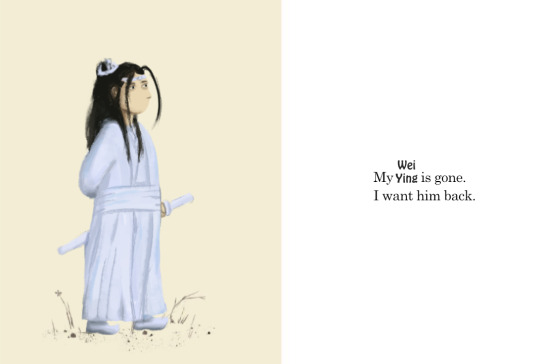

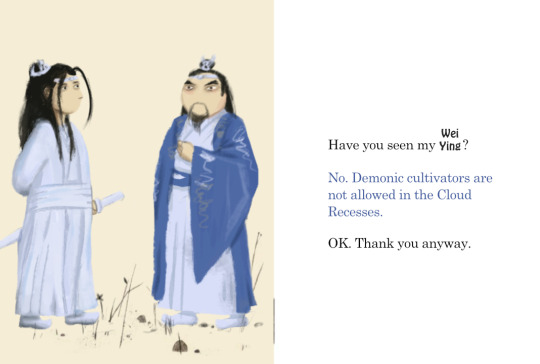
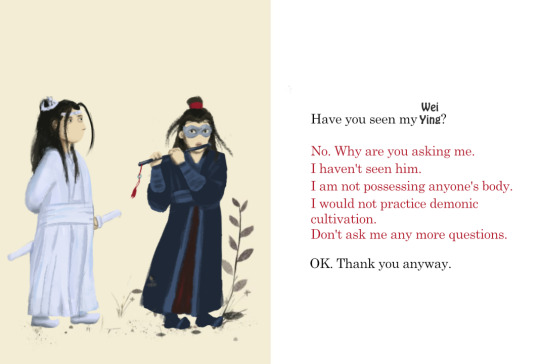
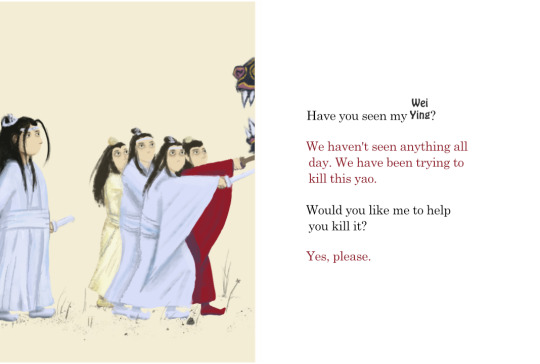
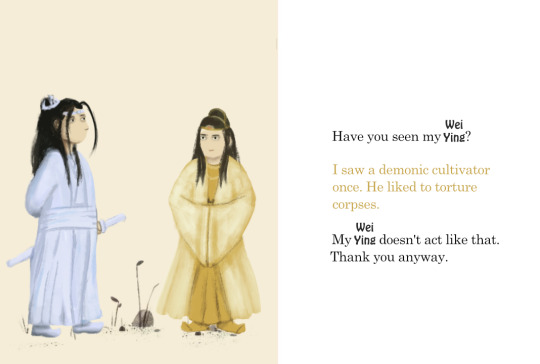
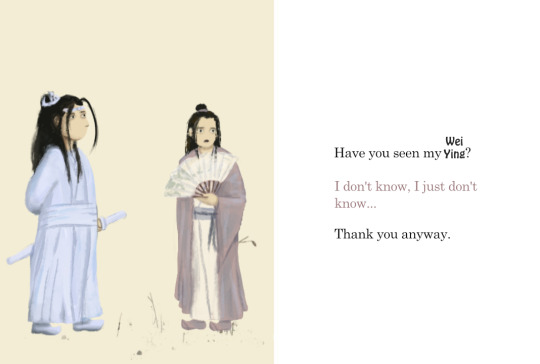

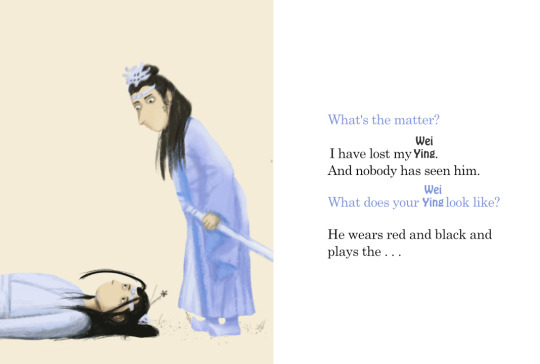

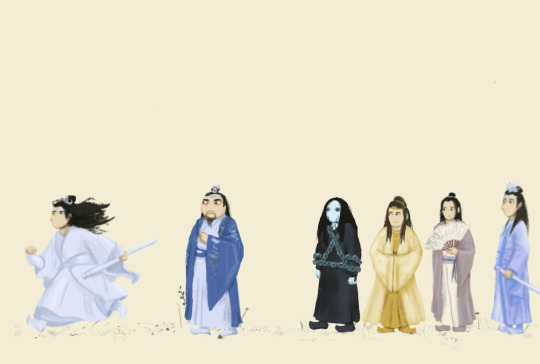
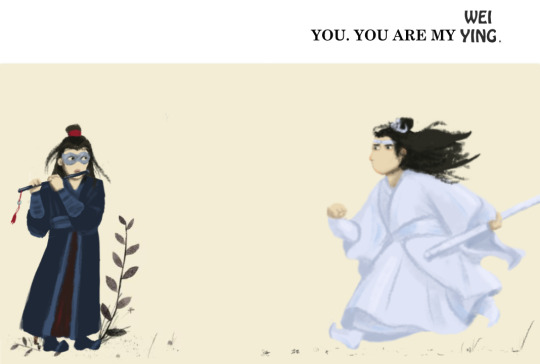

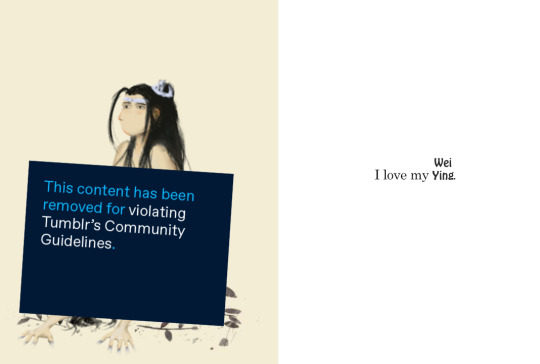
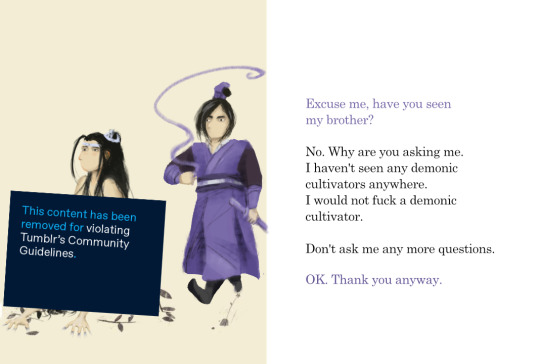
I Want my Wei Ying Back, with apologies to Jon Klassen.
3K notes
·
View notes
Text
In the 1980s in France, musicologists and archaeologists Iégor Reznikoff and Michel Dauvois used their voices to explore caves with notable Paleolithic wall paintings. By singing simple notes and whistling, they mapped their perceptions of the caves’ acoustics.
They found that paintings were often located in places that were particularly resonant. Animal paintings were common in resonant chambers and in places along the walls that produced strong reverberation.
As they crawled through narrow tunnels, they discovered painted red dots exactly located in the most resonant places. The entrances to these tunnels were also marked with paintings. Resonant recesses in walls were especially heavily ornamented.
In a 2017 study, a dozen acousticians, archaeologists, and musicians measured the sonic qualities of cave interiors in northern Spain. The team, led by acoustic scientist Bruno Fazenda, used speakers, computers, and microphone arrays to measure the behavior of precisely calibrated tones within the cave.
The caves they studied contain wall art spanning much of the Paleolithic, dating from about forty thousand years to fifteen thousand years ago. The art includes handprints, abstract points and lines, and a bestiary of Paleolithic animals including birds, fish, horses, bovids, reindeer, bear, ibex, cetaceans, and humanlike figures.
From hundreds of standardized measurements, the team found that painted red dots and lines, the oldest wall markings, are associated with parts of the cave where low frequencies resonate and sonic clarity is high due to modest reverberation.
These would have been excellent places for speech and more complex forms of music, not muddied by excessive reverberation. Animal paintings and handprints were also likely to be in places where clarity is high and overall reverberation is low but with a good low-frequency response.
These are the qualities that we seek now in modern performance spaces.
Sounds Wild and Broken, David George Haskell
11K notes
·
View notes
Text
so judging by how astonished people are by it every time we explain it to anybody, it seems like my wife and I might really be onto something here
during the pandemic, we invented something we call "astronaut time."
when it's astronaut time, it's like we are two astronauts wearing the big helmets, moving around the station on totally separate tasks. one of us is outside the space station and one of us is inside the space station. our radios do not work and we have no way of communicating with each other. we might see each other through the lil porthole windows, but we ignore each other because we both have different things to do.
"astronaut time" is how we get total privacy when we live in the same apartment. I will pretend you don't exist. You will pretend I don't exist. we have a nonverbal, zero-contact signal for when astronaut time is over (usually "I'll draw a smiley-face on the whiteboard in the kitchen when I'm done"). No talking, stay out of each other's line of sight, we are actively avoiding each other, unless you are currently experiencing a medical emergency goodbye.
it has been. a godsend. imagine living with your partner and being able to close every single tab in your brain related to social interaction. no fear of being interrupted by a "hey, quick question--" or "sorry to bother you, but do you know where the scissors are?" or "did you want something to eat, too?" Once or twice a month, we look at each other lovingly, hold hands, and say "baby I think I need some astronaut time tonight," and the other person goes "okay cool. bye! have a nice night!" and nobody's feelings are hurt and we both go and have a lovely evening completely by ourselves.
like idk it's a small thing but it's made our lives so much nicer, so if you and your partner/roommate are both people who sometimes need total privacy in order to recharge, maybe try it
95K notes
·
View notes
Note
Hi there! I stumbled across your podcast when I was rooting around in Tumblr and it has been one of my best accidental finds! I love the concept and the fact that I get to listen to many of my favourite authors talk about their work. You are wonderful for creating an initiative like this and I will be steadily making my way through your list of episodes ❤️
I have two questions that I was hoping I could ask you about. There’s absolutely no pressure to respond to me if you’d rather not.
1) I wanted to know if you’ve had any POC creators on the podcast? I am particularly interested in their perspective on fandom, so I did a tag search but it didn’t come up with anything - although Tumblr is known notoriously for being wonky with the tag searches.
2) Would you be open to having POC writers on your podcast anytime?
Again, I’d like to stress that you absolutely don’t need to respond. I’m sure you get a lot of asks and I don’t mean to take up your time. Once again, love what you’re doing, and I wish you all the best with everything! Thank you for your time ❤️
Thank you so much for reaching out! My favorite thing is people accidently discovering the podcast out in the wilds of Tumblr lol. I am so happy you found it, and so glad you're loving all the fanfiction conversations we've had with amazing creators!
I'm a big open book and all questions are welcome, so I'm really glad you asked! Technically speaking, there is a POC person on every episode, and it's me. I am 1st (and 2nd) generation Chicano. Admittedly it isn't something I talk about very often on the podcast. I think I mentioned it exactly one time during the first Mandalorian episode.
Several of my past fanfiction writer guests have been POC! I won't point out most of them by name without consent, as most of those episodes were focused on the fandoms and fanfictions of those writers and not on POC perspectives specifically, but one I can mention is the episode with DragongirlG. That was our first episode for The Untamed fandom, and DragongirlG offered to give us some thoughts on the fandom as someone who is Chinese diaspora, for which I was very grateful!
I have never outright asked any POC guests to give POC perspectives on fandom without them offering first simply because, at times, it can be an emotionally heavy topic and I don't want any guest feeling obligated since it is nobody's job to educate us.
That being said, if anyone else wants to offer to give POC perspectives on fandom for the show, I welcome that opportunity! We don't shy away from anything on FFM so long as my guest is comfortable and wants to speak about it. POC fanfiction writers are always, always welcome on Fanfic Maverick.
Thank you again for the ask, and keep on rollin'! All my love!
21 notes
·
View notes
Text
I have returned to life bearing more smut. Chapter 4 is out!
Click here to read!
Blissful Ignorance and All Its Benefits
This is my first promo on Tumblr for my bitching fic now that chapter 3 is up!
Rating: Explicit
Archive Warning: No Archive Warnings Apply
Category: M/M Fandoms: 魔道祖师 - 墨香铜臭 | Módào Zǔshī - Mòxiāng Tóngxiù, 陈情令 | The Untamed (TV)
Relationships: Lán Zhàn | Lán Wàngjī/Wèi Yīng | Wèi Wúxiàn, background 3zun
Additional Tags: Alpha/Beta/Omega Dynamics, Non-Traditional Alpha/Beta/Omega Dynamics, Oblivious Wèi Yīng | Wèi Wúxiàn, Alpha Wèi Yīng | Wèi WúxiànAlpha Lán Zhàn | Lán Wàngjī, Top Lán Zhàn | Lán Wàngjī/Bottom Wèi Yīng | Wèi Wúxiàn, Bitching, Self-bitching?Masturbation, Size Differenceo f the penis variety, Anal Fingering, Anal Sex, Knotting Dildos, Large Cock, Small Penis, Size Kink, Accidental Voyeurism, Size Queen Wèi Yīng | Wèi Wúxiàn, Lán Zhàn | Lán Wàngjī and Wèi Yīng | Wèi Wúxiàn Have a Breeding Kink, Plot What Plot/Porn Without Plot, Compulsory Heterosexuality, Humor
Summary:
Wei Ying and Lan Zhan are best friends who live together. Being two unrelated alphas won't even come between them! No, their presentations aren't the problem.
The problem is that Wei Ying can't stop thinking about Lan Zhan's scent. He should be repulsed, but something about Lan Zhan had always drawn him in. And now Wei Ying's body has started... changing.
Or: Wei Ying accidentally bitches himself.
Click here to read!
#mdzs fic#mdzs#wangxian#mdzs fanfiction#omegaverse#smut#wwx is finally starting to grow some braincells
11 notes
·
View notes
Text
Reblog if you're a fanfic writer and you wanna know what your followers' favorite story of yours is ❤
125K notes
·
View notes
